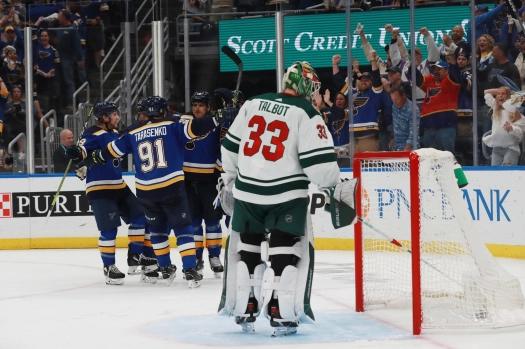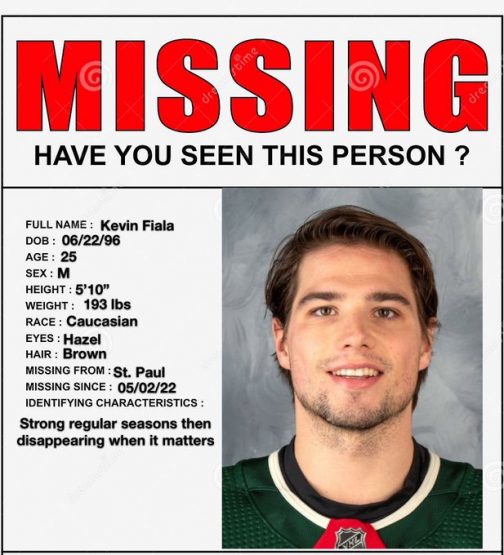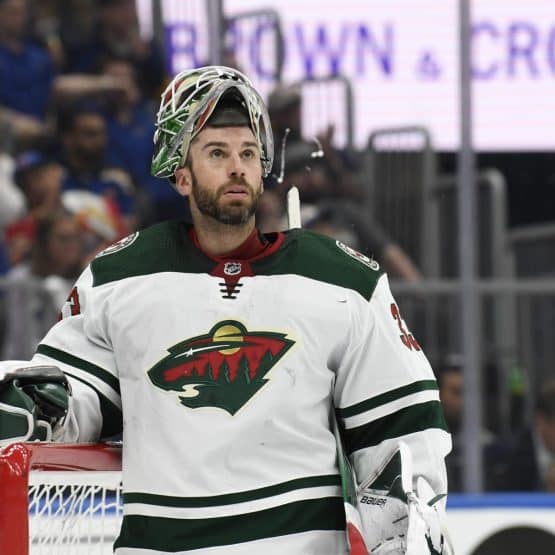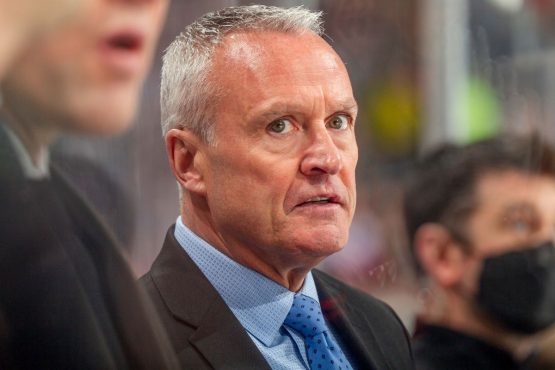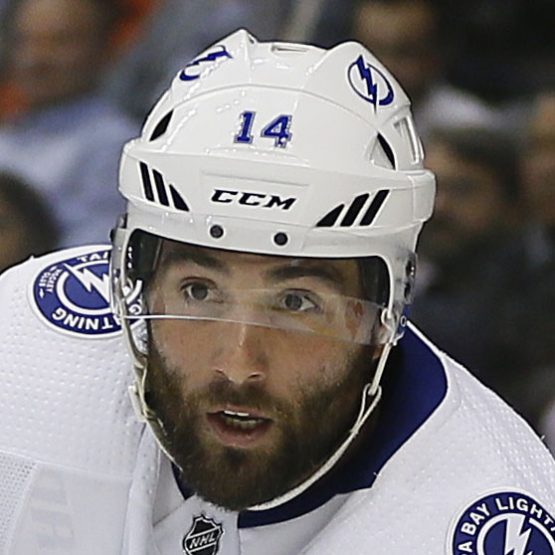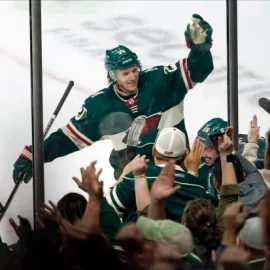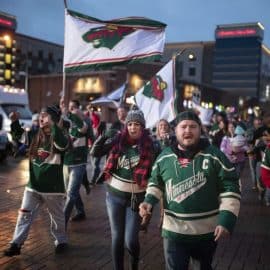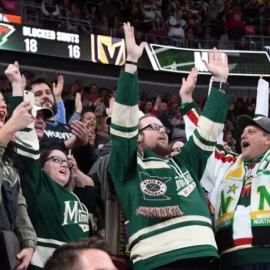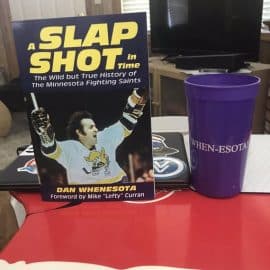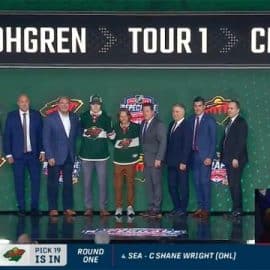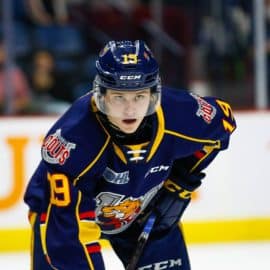True crime shows are popular these days. People are allowed to exercise some deductive reasoning or they just enjoy the lurid details.
Hockey fans can be much the same way as they attempt to rationalize or summarize why their favorite team failed in the playoffs.
Minnesota sports fans have had plenty of practice playing the role of a post-season detective. Strike that, a playoff coroner is probably a more apt description. Let this be a post-season autopsy.
After another 1st round exit, this time as a result of an embarrassing 5-1 Game #6 loss, Wild fans are experiencing deja vu. Another power outage offensively save for one superstar and one hardworking center. Dismal play on special teams, and average but not great goaltending came back to haunt the team.
Truth is, we’ve seen this movie (for the most part) before.
Like the movie Knives Out, everyone had theories and ideas about what (or who) was culprit in this latest playoff flame out.
So what evidence do we have? A 69.2% penalty kill seems to be a great start. Before the Wild began the playoffs, the penalty kill was in the bottom 1/3rd of the league and had been struggling mightily in the home stretch of the season.
All too often, whenever the Wild took a penalty the puck ended up in the back of the net. Every time they went on the penalty kill you felt a sense of dread and for good reason.
Kirill Kaprizov played like a superstar, with 7 goals and 8 points in 6 playoff games. Marcus Foligno, Ryan Hartman and Kevin Fiala who combined for 90 goals during the regular season combined for ZERO in the playoffs.
Fiala’s play was especially confounding because not only did he not score a goal in the playoffs (only registering 3 assists) but he led the team with 16 penalty minutes and appeared tired and uninspired. Was he hurt or was he not getting the same level of support from line mates Frederick Gaudreau or Matt Boldy? At least Gaudreau and Boldy at least had a goal apiece in the playoffs.
Swiss-born winger had shown an ability to create on his own using his tremendous lower body strength and quick bursts of speed to gain time and space but we never really saw anything like that against the Blues. I don’t think the Blues focused on trying to shut him down as much as they did Kaprizov, but he just didn’t seem to have the fire or gas in the tank to carry some of the heavy lifting, scoring-wise.
No matter what, his performance was very disappointing when you consider how dominant and comfortable he played in the 2nd half of the season. As great as Kaprizov was, Fiala did not seem to be that far behind and he helped give the team a 2nd scoring line.
Does that affect the way Wild General Manager Bill Guerin approaches the restricted free agent this summer? He made $5.1 million this season on a one-year deal after the team took the unorthodox step of taking Fiala to arbitration. How much will Fiala want now and will the Wild have the cap space to keep him?
According to CapFriendly, the Minnesota Wild already have $66.2 million in cap space committed next season. With $12.7 million in ‘dead cap space’ due to the twin buyouts of Zach Parise and Ryan Suter and a cap ceiling of $82 million it doesn’t leave a lot of room to maneuver in order to give Fiala a well-deserved raise. Yes, he disappointed in the playoffs but he also had the 2nd best single season in franchise history this year.
Was it all his fault? No. However, he along with the other 20 goal scorers who failed to score more than once was not enough to get the job done.
It will be interesting to see if Fiala’s playoff struggles gives Guerin more leverage to perhaps lower the offer to a level where the team could afford to keep him long-term. Proven goal scorers are not easy to find in the draft or free agency. While the fans across the State of Hockey might be annoyed with his playoff performance I think this team would take a big step back if he were to leave. But it is a real possibility we may have seen Fiala’s last game in a Wild uniform.
As we continue to look at the corpse of the 2021-22 playoff team, what else do we find?
An ‘Easy Decision’ was what Wild head coach Dean Evason said when asked who would start between the pipes by reporters. It was a curious yet defiant response by a coach who had to choose between the high profile trade deadline acquisition of future Hall of Fame goaltender Marc-Andre Fleury and incumbent #1 goaltender Cam Talbot who hadn’t lost in regulation since March 1st and went 13-0-3 in his last 16 starts of the season.
Evason deployed the 37-year old Fleury for the first five games of the series. He went 2-3 and had a .906 save percentage which was eerily close to the .910 save percentage he had in his 10 starts with the Wild during the regular season.
Talbot’s 0-1-2 record and 5.93 goals against average against the Blues certainly didn’t help inspire the team’s confidence but did Fleury giving up 5 goals to the lowly Arizona Coyotes in his last start make the club feel bullish about his play going into the post-season?
Rebound control was a major problem for Fleury throughout most of the series, and the Blues cashed in off on rebounds a number of times. That isn’t to say that Fleury was atrocious or the reason the Minnesota Wild lost the series. A Stanley Cup pedigree, last year’s Vezina trophy winner; Fleury had the resume that one might think would be able to propel the Wild beyond the 1st round.
But this isn’t last year, and the team in front of him isn’t the Vegas Golden Knights or the Pittsburgh Penguins. Defensively, the Wild were a middle of the pack team all season and as we mentioned before their penalty kill was near the bottom of the league.
With “their backs to the wall,” Minnesota gave Talbot the start in Game #6. Former Wild 1st round pick, Nick Leddy scored on a 1-on-5 and the Wild’s house of cards finally collapsed. Professional and accountable, Talbot took the blame for giving up the goal to Leddy.
To his credit he didn’t take a shot at the Wild coaching staff for their choice beyond admitting it pissed him off. His wife was less diplomatic, implying in a tweet that Talbot may be playing for another team next year even though he has one more year left on his contract at $3.67 million. Like many fans, I don’t blame Talbot or his wife for being annoyed by the situation.
Can that relationship be repaired?
In full transparency, I lobbied on Twitter for Cam Talbot to be the starter in Game 1. Our penalty kill was terrible this season and Talbot was better when the Wild were a man down than Fleury was, it proved to be a big difference maker in the series. We’ll never know if that would have made a difference.
Ok, so those are the obvious topics but what other evidence do we have?
Between Game #5 and Game #6, Michael Russo of the Athletic wrote a scathing article about the “laissez faire” approach of Dean Evason. Just to review, laissez-faire is the policy or attitude of letting things take their own course.
In the article, Russo pointed out the lack adjustments the Minnesota Wild had made through most of the first 5 games of the series. No intermission speeches, he’d let the team leaders figure out what to say. Lines stayed the same, defensive pairings stayed the same and so did the goaltender and it there were little to no adjustments in game either.
Contrast that with Blues’ Head Coach Craig Berube who juggled his lines sometimes by necessity as he lost two of his starting defensemen due to injury to say nothing of his biggest change by swapping out Ville Husso for Jordan Binnington.
As a person who has coached at the high school level for 20 years, I understand there are times where you let the players use their talents and abilities and not try to micromanage it. Good coaches though know when their team needs a boost and when to make an adjustment.
Minnesota needed an adjustment for Game #5 after giant missed opportunity in Game #4, and Evason ran with the status quo and the series turned. How could he let this happen? My guess is in the past he didn’t say anything and the team bailed him out. You can try to rationalize it as a calculated risk but when you’re in the midst of a playoff series how long are you going to wait and watch the same mistakes happen? A loss or two and your team could be eliminated.
I understand the point about not always berating your team after a mistake for fear of the team tuning you out, but if you are just going to sit back and wait for things to correct themselves in the post-season you are probably not going to be there for very long.
With the New York Islanders parting ways with Barry Trotz should Dean Evason be concerned? Probably not, but its not like this was Evason’s first opening round playoff failure. Thursday’s exit was the 3rd time Evason’s team bowed out in the 1st round. I would think this latest playoff failure has to give Bill Guerin some reason to perhaps re-think that notion that Evason is the right guy for the job.
So for all of the ‘history’ the Minnesota Wild made this season with a number of individual record-breaking or career-best seasons and the most points ever as a franchise the result was painfully the same as so many others. One and done.
During the trade deadline the Wild added some truculence to its lineup with the additions of Nic Deslauriers and Jacob Middleton. More bigger bodies meant the team would be pushed around less in the post-season. Unfortunately it didn’t seem to work out that way.
Brayden Schenn took plenty of liberties to target the Wild’s smaller skilled players like Kaprizov but anytime he was challenged he would simply turtle to avoid having to pay the price for his actions. While I understand the Wild did not want to get caught with retaliatory penalties no one really did anything to stop Schenn from doing out there.
In addition, Minnesota all too often shied away from contact to get loose pucks and that meant we were giving up possession rather easily and allowing Saint Louis to set the physical tone of the series.
Deslauriers was visibly beaten up a bit in the home stretch (especially after his fight against Nick Seeler) of the season where he felt he had to prove himself to his new club by dropping the gloves. Did that compromise his health for the playoffs? He looked a step or two slower than he did in the regular season.
Same could be said for Marcus Foligno who also appeared to be laboring after returning from a knee-to-knee hit with Kurtis MacDermid in the last regular season game of the year.
Maybe the grind for the playoffs (thanks to the compressed 2nd half of the schedule they had because of Covid-mandated postponements) and home ice advantage exhausted this club. They simply appeared like a team that was physically and mentally exhausted.
So what do you think went wrong for this team? Tell us on Twitter at @CreaseAndAssist!
One last thing, on behalf of Theresa Ferries and myself we’d like to thank all of our readers who gave us a chance this season. We will keep covering the team through the draft and free agency this summer.
Add The Sports Daily to your Google News Feed!
